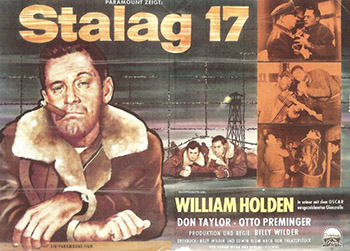If you had only 4 movies to make someone a Billy Wilder fan, what would you choose?
For Film Appreciation Night (FAN) at Epiphany Space, I gave myself that challenge. After all, if we appreciated his movies on all days ending in “y” we would have enough to fill the month, but since I had only Sunday nights, we had to be selective.
So buckle up, and take a ride on the Wilder side…
Stalag 17
Stalag 17 is Wilder’s WWII drama/comedy set in a German prisoner of war camp. The film, which became the basis for the TV show Hogan’s Heroes, earned William Holden an Oscar for best actor, 1954.

Holden plays Sefton, an acerbic scrounger whose introduction sets the tone: he bets his barracks 2 packs of cigarettes that the two men trying to escape won’t make it through the forest. Turns out Sefton is right, and the barracks suspect that he’s colluding with their Nazi occupiers.
Our FANs loved how Wilder mixed silly comedy and serious drama together. The story really holds up over time.
We also discussed the dangers of having an unlikable protagonist. Today, Hollywood is obsessed with overly likeable heroes, or at least empathetic heroes – ones we can relate to – but not so with Sefton.
He’s no hero. His view is dog-eat-dog. His strategy is to milk as much from the other prisoners as possible so he can trade with the guards for better food and access to the Russian women’s barracks.
Wilder uses a couple of strategies to put the audience on Sefton’s side:
- Put him on defense. We suspect he’s not colluding, and that sense of unfairness makes us root for him.
- Make him active. He’s not complaining (much) but owning his persona while he runs mice races, sells alcohol from potato peels, and eventually, hunts down the real mole.
In addition, it’s a group story. We want the barracks to come together and show up their occupiers. There IS a mole in Stalag 17, and we need them to find him.
This task keeps us watching.
Some Like It Hot
Next, consider the movie AFI considers the greatest comedy America has ever produced, Some Like It Hot.
The movie was almost part of our Thriller/Comedy series but I knew Wilder month was coming.

Billy Wilder offers us two hapless musicians, Joe and Jerry (Tony Curtis and Jack Lemmon), narrowly escaping their speakeasy job and losing their coats at the dog track, who then witness the St. Valentine’s Day massacre and have to disguise themselves as women in a FL hotel to avoid being killed by the mob.
The film really stands up over time. It’s still as funny as it’s opening night in 1959, with great leads, including (a pregnant) Marilyn Monroe, great one-liners and callbacks (“Type -O”, “Zowie”, “I’m a girl… I’m a boy!”) and a brisk pace.
It was too bad Billy Wilder didn’t maintain the mobster threat through act two, but we were having so much fun falling in love that we didn’t care.
The one question that got us really discussing was: why are man-to-woman cross-dressing stories so funny (other examples include Tootsie, Bosom Buddies, Bugs Bunny)? That is, women dressed as men (Albert Nobbs) don’t usually get the laughs.
One potential theory is that men – usually in a superior position in society – are taken down a peg by being forced to take the woman’s role. Since comedy is about “dropping” a character for comic effect, it makes sense that the higher fall is funnier.
That said, I think it may have more to do with the dramatic tension. In The Major and the Minor (also by Wilder!), a woman pretends to be an underage girl in save on train fare. In Two Mules for Sister Sarah, a prostitute pretends to be a nun.
In both, the woman’s deception is for her advantage, and much like Viola in Shakespeare’s Twelfth Night, once on, she finds it hard to stop. But she must in order to get what she really wants.
This, however, doesn’t explain why Some Like it Hot is so funny. It just is. Hilarious.
Ace In the Hole
This gritty tale of a journalistic time bomb proves how ahead of his time Wilder was.
Chuck Tatum (Kirk Douglas) is trying to rebuild his reputation in a small-town newspaper. He’s stuck and sick of it, until he happens upon a career-making story: a man trapped in an Indian mountain cave. If can keep him underground for a week, and build the story the way he wants to, he’ll have the world in his pocket.

Ace in the Hole‘s theme is “tell the truth” vs whatever Tatum’s version is.
We started the night with a Kirk Douglas interview where he discussed Billy Wilder’s ability to come up ingenious plot, and explained that when he’s playing a strong character, he tries to figure out where he’s weak (and vice versa).
Here, Tatum is strong at storytelling, leadership, ambition, and daring, but weak in morals, manipulation, and his vices.
The FANs were all impressed with how tight and relevant the script was. Despite being in black and white, the movie could be made today, and would stand proudly beside others of its ilk, like Face in the Crowd, Broadcast News, Wag the Dog, and Nightcrawler.
The Apartment
Saving (possibly) the best for last, Billy Wilder’s The Apartment is 1961’s Best Picture Oscar winner.
Wilder came up with the idea while watching David Lean’s Brief Encounter. He thought the guy who allowed his home to be used the love nest would make an interesting character. He imagined such a guy, single and alone, coming home to a bed still warm from someone else’s lovemaking.
That idea stuck with Wilder until he developed Some Like It Hot, where he met the perfect actor for the part: Jack Lemon.

Buddy is an accountant who works his way up the corporate ladder by loaning his apartment as a love nest for other executives. The real problems start when the head of HR takes Buddy’s crush there.
The Apartment shows Wilder’s best example of the “Lubitsch touch.” using a cracked lipstick case to deliver information more eloquently than words ever could.
There are many theories, but in short, Billy Wilder was the master student of Ernst Lubitsch, whose “Lubitsch touch,” which refers to the charming juxaposition of ideas, or a simultaneous collision of opposite emotions.
In this case, Buddy gets his promotion, a new office, and buys himself an “executive hat.” He’s funny, in top form and at the office party where he chats up his crush Fran with drinks. She hands him her broken lipstick case so he can see himself in his new hat, and he realizes it’s the same lipstick case his boss left in the apartment.
Fran is suddenly the other woman, the broken woman, and she confesses as much when she says the case represents how she feels.
And it’s the central conflict Buddy must overcome if he’s to become a mensch, “a real human being.”
The FANs discussed Wilder’s extraordinary use of genre (again), and debated other casting choices. We realized that everyone was perfect, even down to Buddy’s “mensch” neighbors.
Some Like It Hot‘s other cross-dresser, Tony Curtis, would have brought a different edge to the piece, but probably couldn’t have rehearsed his love speech to a chair as well as Lemmon.
In any event, The Apartment is funny, clever, and poignant, a must for all screenwriters trying to develop their comedy/drama skills.
More on Billy Wilder
If I had another month, I would fill it with the other Greatest Billy Wilder’s:
I could go on. I didn’t mention the Seven Year Itch, with its famous scene Marilyn Monroe’s legs exposed by the subway breeze. Or Love in the Afternoon, which is more than a little bit romantic and creepy in equal measure. Or Lost Weekend, or the Major and the Minor…
Billy’s later work lacked the punch of his early hits, and he made an indelible mark on cinema. If you’re not a fan now, watch the above and you will be.
